 To remind (and renew) the tradition of the “fucanoi”, bonfires traditionally held in Buccino on 19 March in honor of S. Giuseppe, we propose an article dedicated to the event in 1959, written by the young Buccinese Nicola Murano and published in the precious magazine “Literary aspects”, directed by prof. Gerardo Raffaele Zitarosa, our honorary fellow citizen.
To remind (and renew) the tradition of the “fucanoi”, bonfires traditionally held in Buccino on 19 March in honor of S. Giuseppe, we propose an article dedicated to the event in 1959, written by the young Buccinese Nicola Murano and published in the precious magazine “Literary aspects”, directed by prof. Gerardo Raffaele Zitarosa, our honorary fellow citizen.
A story, a window open on the past and a precious testimony of the Buccini traditions…
Buccino, 18 marzo 2017
Emanuele Catone
Buccino Folklore. The Bonfires of S. Giuseppe
S. Giuseppe, recognized patron of the universal Church, he is the protector of the workers; but in Buccino, this year, the solemnization of the Saint from the symbolic point of view of the second attribution could not take place coinciding with the anniversary of his feast, because in the church the floor was paved with tiles given by a devotee; and it was delayed for a few months, without having lost even a little of its Christian and social importance.
The simulacrum of the putative father of Jesus is not carried in procession through the country, nor are there the shots that punctuate the slow pace of the sacred processions. None of this; ma, in addition to the countless liturgical functions, in honor of S. Giuseppe light up, in the squares of the town, the characteristic bonfires. And it is mainly on this typical folklore note that I wish to entertain the reader rather long.
The bonfire festival dates back to ancient times and it is difficult to accurately determine its starting date, as well as the meaning that was certainly given to it by those who established it. Who knows what had to be seen in the tongues of fire that rose red towards the sky! Perhaps the heat of that flame was thought to cement the unity of the family, or contribute to strengthening the bonds of friendship between the inhabitants of the same ward. Being mine, be well understood, mere interpretative inferences span in the world of fantasy, I will stop on the external aspects of the event, which seem particularly attractive as an exclusive work of the boys, result of their initiative.
A month before S. Joseph begins their hard work. They meet according to the ward they are part of. The result is groups of homogeneous and compact ethnic affinity, divided by irremediable parochial rivalries, for which it is not difficult to witness scuffles that often break out among the boys of the different areas of Buccino.
They remind us of the fierce struggles that take place between the districts of the city of Siena and the football derpa, which split the fans of the same city into two opposing opposing factions, against each other.
They leave, therefore, the boys from the village around three in the afternoon, equipped with rope, almost always without having previously informed the mother for fear of getting stuck in the house; it must be honestly admitted that no parent can authorize their child to undergo the trip of the countryside, to return with a load on his shoulders. Then it would be necessary to see how many attentions their person makes in order not to appear tired, after the great effort, in the eyes of the parents, the moment they come home.
Often they don't come to the fort (1) and stop along the way, having in a spotted background some salts put by the farmers to dry between the rows of the vineyard; like a swirl of dust stirred by the wind, they go down the slope that separates the plot from the path, and in two jumps they are at the branches woven and folded several times. The preparation of the bundle is quick; sometimes the boys do not agree on the transportation of the heaviest: the reason is that everyone wants to go for the strongest and only gives up when he tried to keep it on and immediately had to throw it, not infrequently on the feet of his friend who was close to him, because he felt his legs flex under the enormous weight.
There are those who load the sarcina on the shoulders and those who wear it on the head as women use, but they all walk in single file on the streets dotted with mota (2) slippery. To hold the burden with your hands you cannot look at the narrow roadway opened by the donkeys in the dense stones, so it is easy for someone to stumble and fall face down in the middle of a puddle. One can imagine what happens: the thud makes violent splashes of mud fly for a certain ray, that invest the other pedestrians on whose faces black patches are printed, capable of radically changing the physical features of the semblant. What about the one who fell? It is useless to talk about the tremendous efforts made to get up from that uncomfortable and malicious position. (It should be noted that the bellette (3) are located in the hollows of the streets where, attracted by a mysterious sense of instinctive understanding, donkeys stop to fill them with their liquid excrement). Sometimes the first attempts are not enough because the fallen cannot prop his feet against anything firm and solid and still remains to lie in the bruise quagmire. And since he cannot receive help from his overburdened companions of the same burden, try in every way to get dry on all fours. He finally made it and stands up, heaving a sigh of relief! But how it has changed: he no longer recognizes himself with that patina of grunge that hides his face and hands! Even the comrades laugh at it, and I do not exclude that he would also rave about laughter if he could see, through the mirror, how it got dirty with the damned slip. I am not telling you about the clothes whose original color is very difficult to trace for the pillacchere (4) that have attached themselves to each point of them. The shoes even seem to come out of a sculptor's cast, because the joints of the uppers and the stitching of the soles are no longer visible.
How will he have to retire? He does not give up and at the first fountain he washes his hands and face quickly; finally, as soon as the shoes are peeled from the loam boots, he borrowed his coat from a friend and went home to change clothes. So at least for that day paternal anger is avoided.
Where they store wood? A basement, a stable corner, a little space in the cellar and in the vegetable garden of the boy who was lucky enough to own it, it can be useful. When such deposits were not sufficient, floors are used, to the courtyards, ai mandrelli (5) that are not lacking in the ward; the pile of the first day gets bigger and bigger due to the afternoon addition of new wood; the stack increases, thickens, reaches considerable heights; then it is taken by storm by the boys who climb on it with a great crash and begin to press to reduce its volume, in order to obtain more space in the improvised woodshed.
When they get to the woods they immediately go to work: the brooms are broken and the shrubs twisted and cut to the stump by sharp shears; in a short time the operation area remains as kidnapped, free from the intricate bushes of the bush: new hordes of Attila, they take everything away and do not leave a blade of grass standing!
Of course, the damage they cause to tree vegetation is enormous: but they do not realize this and tear and unravel as if it were the vineyard of Renzo or municipal property. Sometimes the owner who has seen them or has heard the hustle and bustle of scraps rushes; ma, before he gets close, the raiders of his forest have already abandoned everything and run away so as not to be recognized, or worse, so as not to get caught.
***
The day of S. Giuseppe the accumulated material is baked from the hiding places and taken to the square where it must be burned a little at a time. Even the girls do not skimp on their collaboration and return, "After going down and up the stairs" of the many houses forming the small local community, with olive branches and heavy, gnarled oak logs, while the males are spoiling the hedges of the gardens and scerbando (6) pitchers from trees (7) flowering.
At around twenty one o'clock religious services end in the Church, which, moreover, are long for the panegyric woven on the Saint; and the temple, crowded with faithful in this circumstance, it empties little by little. Here is the time to set the big bonfire on fire. A dense and blinding smoke rises before releasing the flames; when these flicker with frightening impetus, a suffocating heat forces the onlookers to withdraw; some elderly person, instead, it arms itself with a long pole with a forked tip and prevents the embers from burning only on one side.
It must be said that not all wards have small squares: in this case, the fire must be lit in the casing of a transit route; i dirimpettai walls, therefore, they get soaked in heat, given the short distance that separates them, and radiate it; as a result, people forced to go beyond run away in order not to burn themselves; others more cautious or less elastic for old age, not excluding women, especially those anchored to the outmoded fashion of the long pleated skirts and the collared bodices ending in ruff (8), change itinerary, it doesn't matter if it matters a little bit more to go home.
Everywhere you can hear the characteristic crackle of the burning broom, the crackling of tortuous pieces of oak, from which myriads of monachines fly, clouds of flames, that rise to the sky and get lost in the darkness of the firmament.
They intonate in unison, by the younger ones, the songs of S. Giuseppe, while the old women chant prayers and shell the rosary.
The comic note om these popular amusements never fails; there is always the drunk who wants to jump "the fucanoio". They are crazy laughs that explode suddenly, noisy and present a sense of pleasant expectation for an extremely entertaining show.
It is true that he decided to jump, but a niche perhaps afraid of the arduous challenge. He, finally aware of the risk he is about to take, he would like to retrace his steps and postpone the test of his athletic prowess until later, perhaps waiting for the moment when the flames have moderated their reach. But the crowd gives him no respite and reminds him to keep his promise, where ever he does not want to expire in the estimate of which they are honored to surround him. He does not have to act like a pusillanimous, on the contrary, with a concrete act of courage he wants to show that the coward's tinge is undeservedly tackled by his temper as an old soldier of the First World War. Unfortunately, thought does not correspond to action: obviously it is easier to talk than to do! The crowd instigates him, it targets him with abusive epithets, it motivates him, rimbrotta, he would even like to push him on the flames that burn without interruption, because continuously fed with dry brushwood. However difficult you are to hang on, manages to dodge the knocks and goes to the launch pad. Takes a run-up e, as soon as it arrives near the obstacle to be overcome, it stops suddenly, retreating like the horse when it is shaded. At this point the young men cackle, Malmenian, they insult him; then, in a moment of paroxysmal exaltation, try the test again, but repeats the gesture of refusal as it comes near the great fire. How regretted he has compromised his reputation, making a rash decision taken in the fumes of wine.
Savonarola had more luck when a downpour, came suddenly, sent "proof of fire" upstream, that the hot Franciscan was supposed to support in Piazza della Signoria in Florence, to face the divine judgment following the excommunication inflicted by Pope Alexander sixth.
Recovered from the fiasco of the first attempt and gesturing with his hands, the poor man made it clear that courage had returned. Thus the second half of the show aired.
Ours now makes superhuman efforts to behave, an air of detachment; he realized after so much that he cannot refuse, otherwise it would be mockery for him, pity, pity: and then the prestige of his honor where it would end up? As a stubborn and stubborn man he had to give a tangible sign of his jumping skills; having decided, therefore, he rubbed his hands, he leaned forward a little to catch the air (9) and away like a squirrel! But the fear had not left him and he went around the circle of fire. Then it disappeared. He had deluded everyone, but he wore the skin of his face intact.
***
Ten o'clock strikes the clock; then eleven o'clock: The time has come to fund the stocks. The boys are reluctant to finish, and justify the resistance by pointing out that their effort would be crowned by a resounding failure if the fiery demonstration ceased before those taking place in other places.
In the meantime, night falls and the request to hasten the rite is unanimous; soon of the great stake, of the colossal pyre if the bonfire can be called even if it is not used to cremate corpses, a large mound of embers remains, to be distributed equally among the inhabitants of the neighborhood, and instead of the burning coals, the imprint of incinerated wood remains.
Even in the countryside the votive fires are lit.; there is plenty of fuel there! Just look out of a window to see it in all the districts of the countryside. They tap the rural landscape and burn in devotion to the saint, as if they were stars stolen from heaven and put on the ground to illuminate the human path more closely. You have the impression, looking at those specks of light, that they are close, who are not far from us; instead I am a lot, so far away! I seem to hear the song of those present, to hear the litanies singing in the silence of their sown fields.
Then the bonfires begin to go out gradually, like the skylights that tradition wants at the foot of Christ in the Sepulcher, when the oil that keeps them alive begins to run out.
Even in the countryside the wood is over and humble people return to the farmhouses to sleep!
The silence of the night has now spread its wings; on the ground the noises ceased and up there, in the sky, God continues to look at us with the pupil of the many luminous corpuscles hanging from the ethereal pavilion above us.
Buccino, June 1959.
Nicola Murano
Extract from «Literary Aspects», year 1959, fasc. III, pp. 64-67.
(1) thicket.
(2) Mud.
(3) melma.
(4) Mud stains.
(5) Dark places, porcilaie.
(6) uprooting.
(7) Sprouts.
(8) Cloth band that wrapped around the neck and chin.
(9) The run-up.
NB. Notes are not part of the original text. They have been added to clarify some little used terms (E.C.)
The photo dates back to the '80s and is by Mario Chiariello, who kindly granted us the use.
It is taken from the archive of “Buccino nella Storia” available on Facebook come on Flickr.
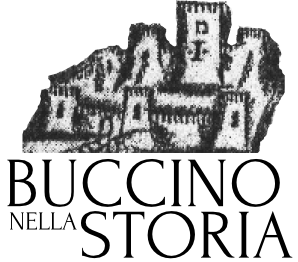
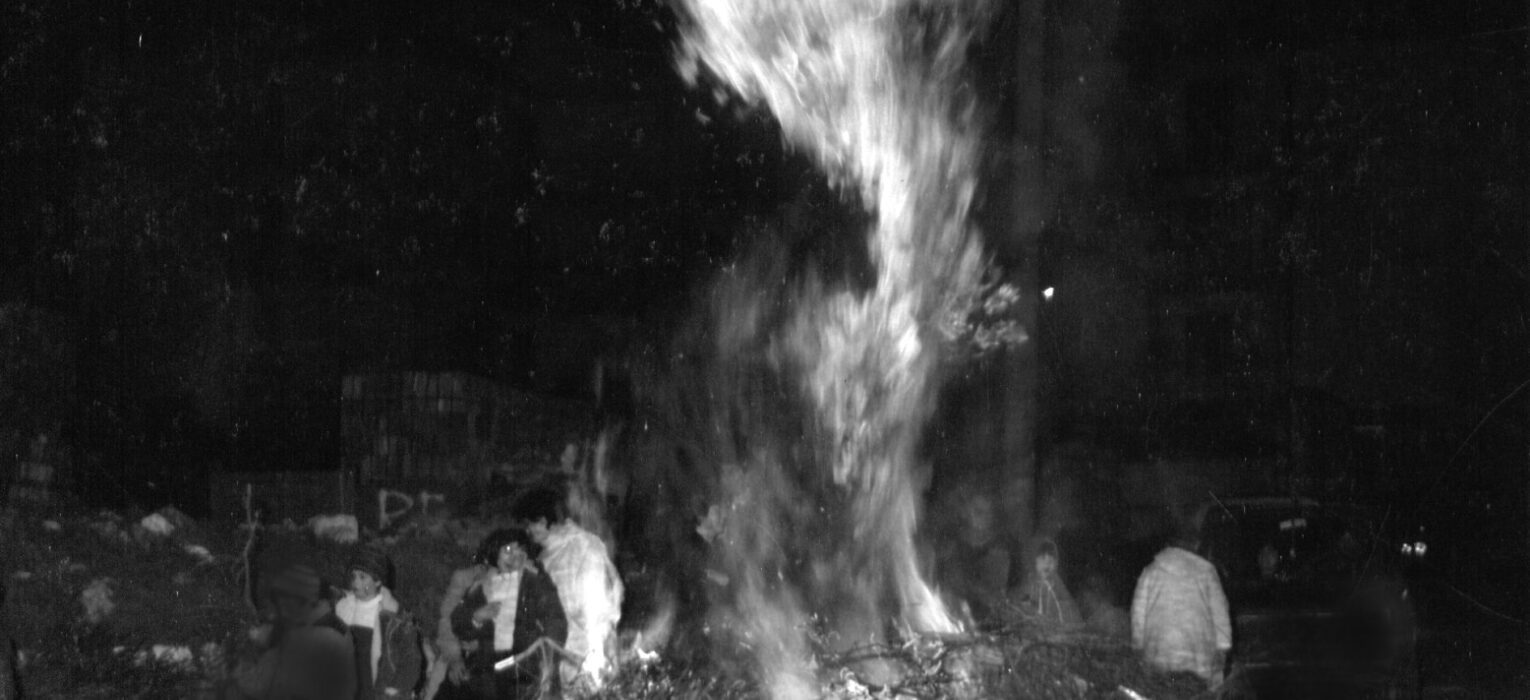
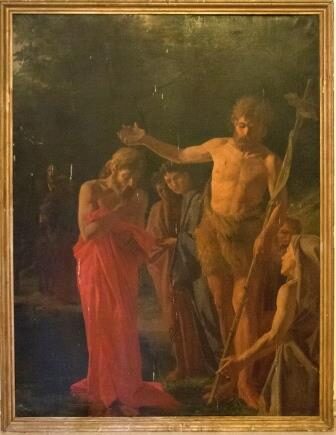
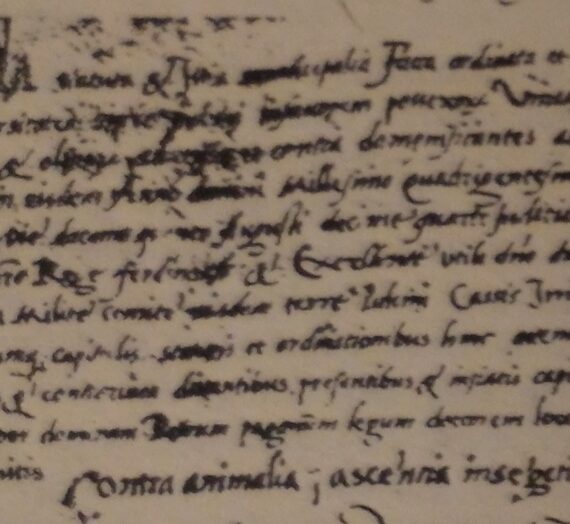
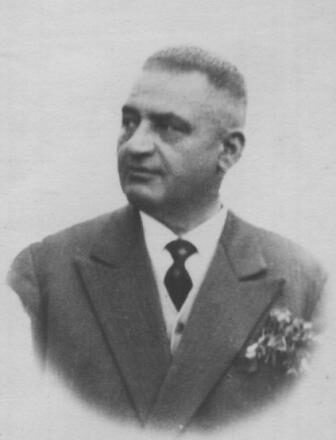
Marie Antoinette Monaco
Thank you for this beautiful narration of a Buccino tradition, brought to the attention. This year too has occurred?
buccinonellastoria
And, also this year there was a large bonfire on 19 marzo!!!